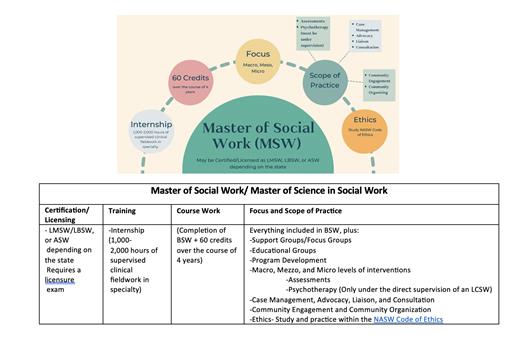Background
Sickle cell disease, an often-painful lifelong inherited condition, is layered with acknowledged social determinants of health and systemic social inequities (Hassell, 2010). Psychological stress, depression, and anxiety can be linked with the disease's wrath along with financial hardship, limited healthcare access, racial discrimination, and cognitive and behavioral challenges. Although the need for quality psychosocial support exists for this vulnerable patient population, lack of understanding of the social work role was identified as a barrier to care, along with others, by National Alliance of Sickle Cell Centers (NASCC) social workers at the 2022 consortium conference. Like other disease realms (Bartlett et al., 2022) that have referenced physician lack of knowledge around the breadth of roles, capabilities, training and expertise, the social work scope of practice knowledge gap amongst providers was voiced as a clear barrier to efficient and effective patient care in the sickle cell realm as well. As a result, a subcommittee of NASCC social workers set out to provide an educational guide and breakdown of the social work profession, to help address this ever-present issue.
Methods
Five social workers gathered data of the various social work roles from other NASCC social work participants and online sources. Job descriptions from seven institutions were shared for the project and an itemized breakdown of education level, practicum training and experience, and licensure requirements were outlined.
Results
A detailed table of all tasks, course work, training, licensure, and scope of practice was created and displayed in a presentation for all NASCC in person providers. For each education tier (BSW, MSW, PhD), details of the associated requirements (training hours and course requirements), licensure (CSW, LCSW, LMSW, LBSW, etc.), focus (macro, mezzo, micro) and scope of practice (tasks involved) were displayed via both a table and visual illustration for other disciplines reference and awareness. NASCC medical providers shared their appreciation for the detailed breakdown of social work levels and expressed the need for this guide to educate other interdisciplinary team members and administrative staff alike.
Discussion
Many medical providers are unaware that the term social worker encapsulates varied levels of education, training, licensure, and scopes of practice. It is important for interdisciplinary team members to understand the integral social work role, its capabilities, breadth of skills, and specific responsibilities. Whether a case manager, transition coordinator, or licensed therapist or counselor, knowing the nuances and qualifications of each position under the social work umbrella can help to better inform care processes, referrals, and appropriate access to quality care.
Disclosures
Raj:Jazz: Consultancy, Speakers Bureau; Pfizer: Consultancy, Speakers Bureau; US WorldMeds: Consultancy.


This feature is available to Subscribers Only
Sign In or Create an Account Close Modal